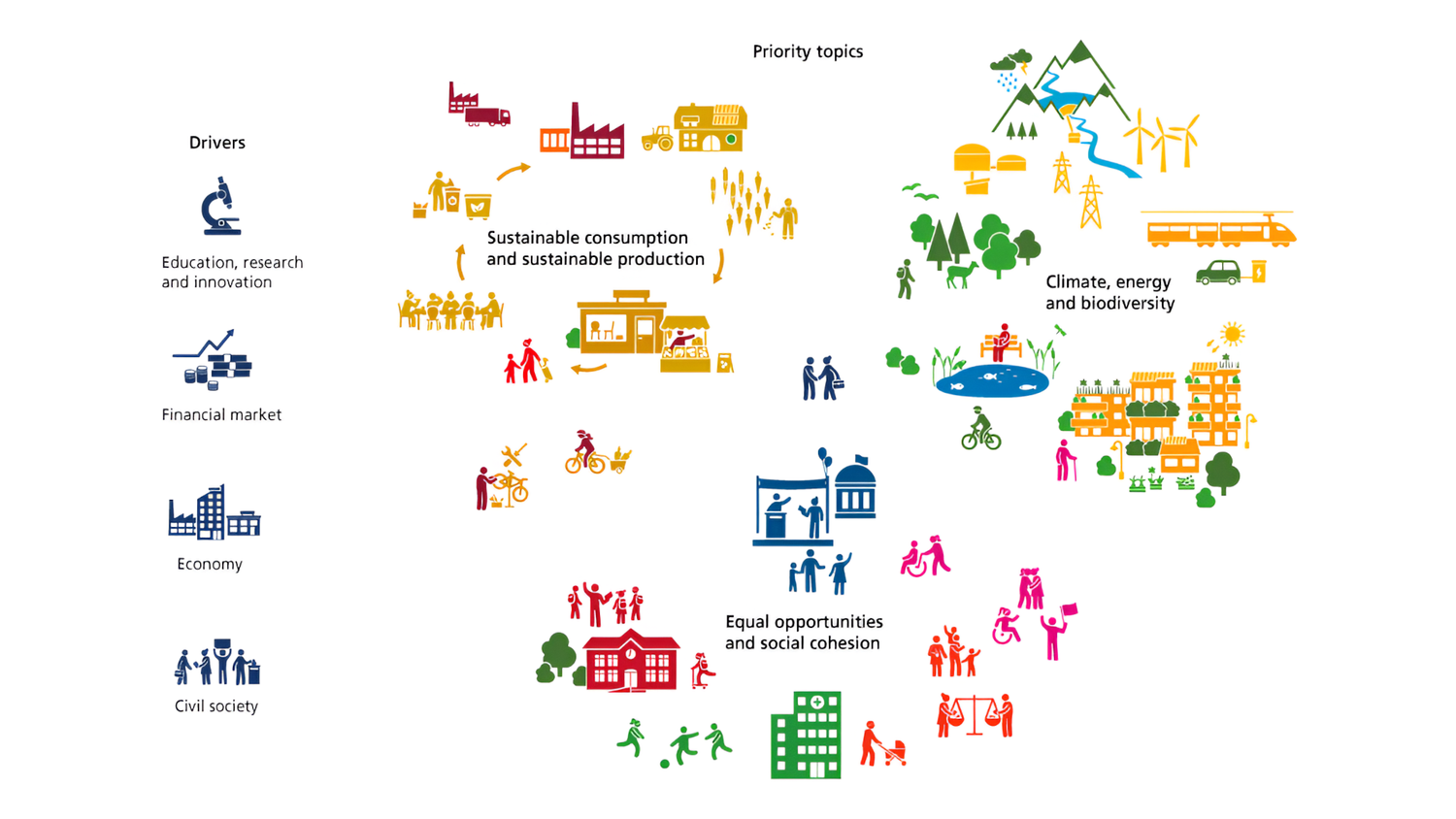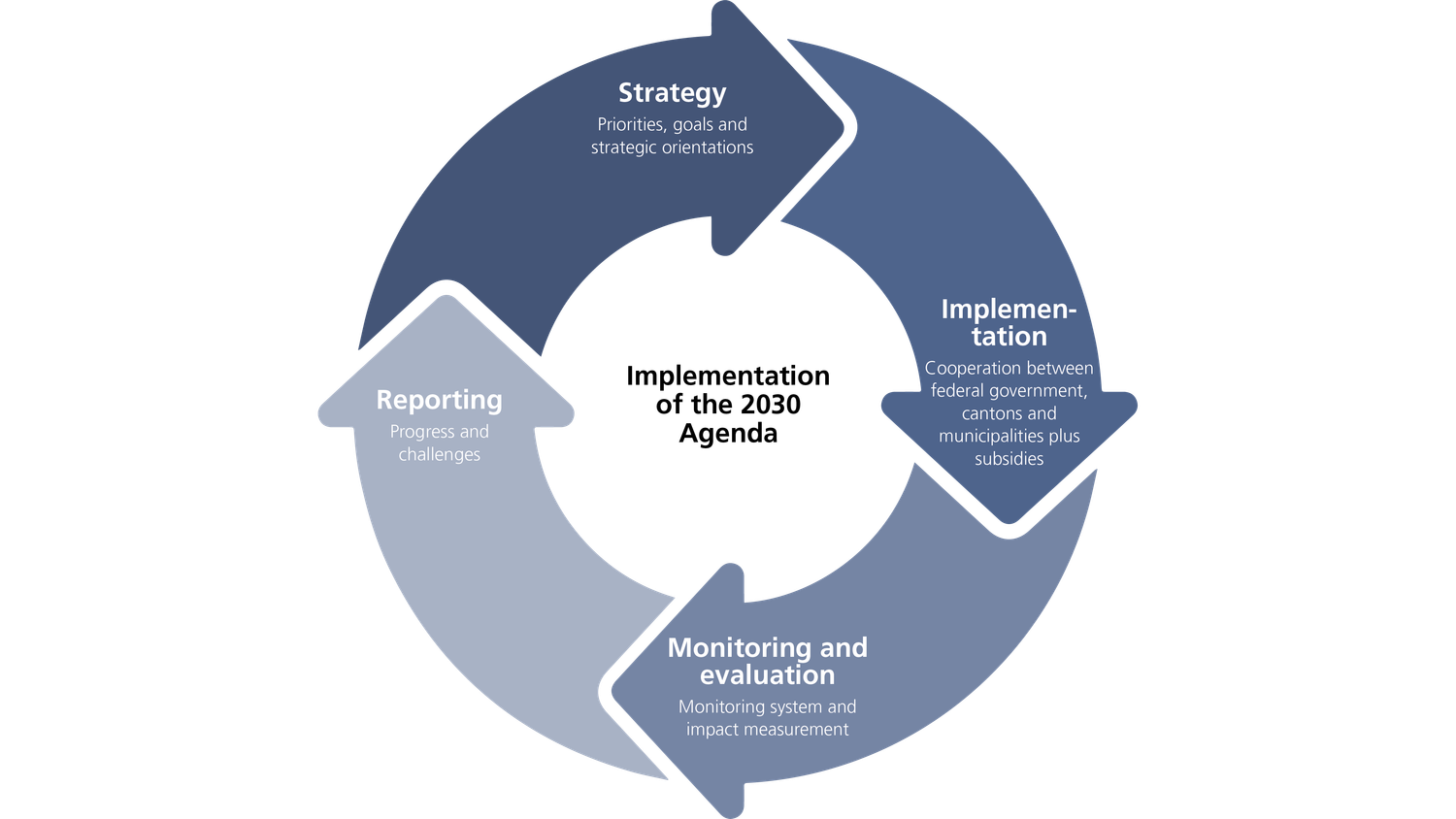Implementing the 2030 Agenda for Sustainable Development
Since its adoption in 2015, the United Nations 2030 Agenda for Sustainable Development has served as a frame of reference for policy in Switzerland. In the 2030 Sustainable Development Strategy (2030 SDS), the Federal Council sets priorities for implementing the 2030 Agenda in Switzerland. The 2030 SDS is accompanied by action plans and country reports that contain measures for meeting the objectives of the 2030 Agenda.

The implementation of the 2030 Agenda is guided by various instruments over the course of a multi-year political cycle. The primary elements consist of the 2030 Sustainable Development Strategy (2030 SDS), its related action plans outlining specific implementation steps for the 2030 Agenda, plus stocktaking surveys, interim reports and country-level reporting that monitor progress, highlight challenges and pinpoint areas requiring action.

2030 Sustainable Development Strategy
The 2030 SDS from June 2021 serves as the Federal Council’s primary tool for implementing the 2030 Agenda, laying out sustainable development policy guidelines through 2030. The strategy defines the priorities, goals and strategic approaches that the Federal Council will use to achieve the 17 SDGs (Sustainable Development Goals) by 2030. These are binding for all areas of federal policy. The strategy’s 10-year horizon ensures planning certainty and continuity. The Federal Office for Spatial Development (ARE) is responsible for the 2030 SDS.
The three priority topics of the strategy are:
- Sustainable consumption and sustainable production,
- Climate, energy and biodiversity,
- Equal opportunities and social cohesion.
Action plan
To complement the strategy, the Federal Council adopts a shorter-term action plan containing 2030 SDS measures at the beginning of each legislative period. These measures are aimed at areas where gaps still exist or where greater coordination between policy areas is required. The 2024-27 Action Plan contains 22 measures targeting the priority areas of the 2030 SDS.
Implementation
Implementation of the 2030 SDS at the federal level falls to the designated federal office. In line with the 2030 SDS, all federal offices support the implementation of the 2030 Agenda within their respective domains. They integrate the principles and objectives into their planning, budget and policy steering processes, regularly sharing updates about their progress. In this way, the federal government aims to guide and inspire other agencies while setting an example. The federal government works in close partnership with cantons and municipalities to ensure implementation at the subnational level, supporting them and other important stakeholders with various funding programmes. The federal government fosters dialogue between stakeholders and shares successful case studies through ARE exchange platforms such as the Sustainable Development Forum and Dialogue 2030.
The strategy emphasises that in addition to the federal government, cantons and municipalities, there are other actors that play an important role in implementing the 2030 Agenda: The main drivers are civil society, the economy and financial markets plus education, research and innovation. These actors can exert special influence on many key issues. The strategy describes the conditions needed to make this possible.
Monitoring,interim reports and country reports
Monitoring the strategy and its implementation relies on several statistical tools, mainly the Federal Statistical Office’s MONET indicators and the cantonal Cercle Indicateurs system. Additionally, a detailed qualitative assessment occurs every four years by creating a country report based on an extensive evaluation of Switzerland’s implementation of all 17 SDGs and 169 targets, addressing the question: How well has Switzerland progressed in its implementation of the 2030 Agenda? This country report, which is accompanied by a statistical appendix from the Federal Statistical Office, is presented to the Swiss population and UN member states.
Interim reporting is another management mechanism. The Federal Council’s first interim report on the implementation of the 2030 SDS (approved on 24 January 2024) provides information on how the strategy is being implemented. Highlighting both progress and challenges in implementation, the report comes with a statistical appendix that combines MONET 2030 indicators (linked to the 2030 SDS objectives) and additional statistical information.
Documents
Find out more
Contact
Federal Department of Foreign Affairs FDFA
Prosperity and Sustainability Division

